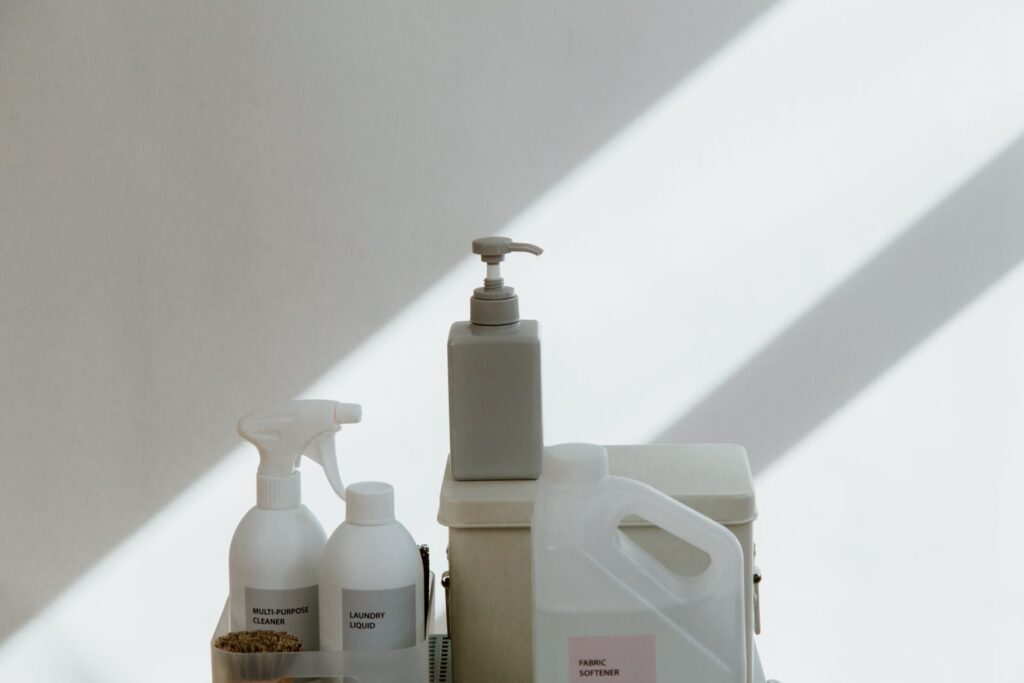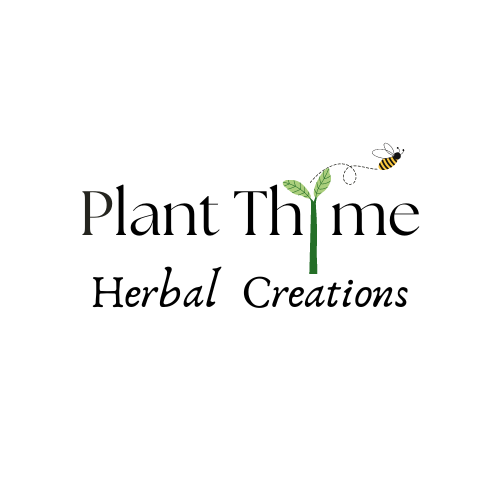How to Remedy Headaches Naturally & Keep Them Away for Good

Headaches are a total pain! We’ve all had them and we have all tried various remedies to make them go away and stay away. Most of us reach for an over-the-counter pharmaceutical or maybe even something stronger, but at what expense to the rest of our bodies?
Disclaimer: Plant Thyme utilizes some affiliate links which may result in a small commission from clicks that result in a purchase. Not all links that are published within this blog post are affiliate links.
Headache remedies can be found among many different plant species all over and I will discuss some of these more common herbal headache relievers in some detail shortly. However, the goal in the first place should not be just to focus on natural ways to remedy them, but on why you are getting them and how to prevent them in the first place.
Let’s begin with a little self-dissection about our daily habits and what, if any, of those daily habits could be contributing to frequent headaches. Now, this isn’t going to be for those of you who perhaps had one too many cocktails the night before and now you’re suffering from a pounding hangover headache. You most likely know the cause and that headache will usually remedy itself with a bit of hydration, food and sleep.
This self-dissection is for those of you who suffer from more frequent headaches and are looking for ways to remedy them in a more natural and holistic way rather than reaching for the pharmaceuticals every time.
The purpose of dissecting your daily habits will be to try to find some correlation to some outside factor that may be contributing to your headaches. This can be accomplished by keeping a daily headache journal. The idea is to write down as many details about your day, how you slept, what you ate/drank, what you were exposed to and your overall emotional well-being and then write down whether or not you suffered from a headache that day.
The more detailed you can be, the better your chances of finding some causation of the tension in your head. That is step number one. Try to find the cause of your headaches.
Studies have shown that consistent suffering from headaches can have specific triggers. Those triggers have included: hormonal changes, consumption of certain foods, alcohol, caffeine, monosodium glutamate (MSG), changes in sleep patterns, and/or certain medications.
Headaches can stem from a plethora of other contributing factors as well: dehydration, trauma, stress, exposure to certain chemicals or toxins, vitamin deficiencies, etc., etc., etc. The amount of potential triggers does make it difficult to narrow down the cause and nip it in the bud, but again, dissecting your daily routine may help narrow down the process.
Let’s go over some of those previously mentioned, potential headache-causing factors in a bit more detail, shall we?
Diet
What you eat and drink day in and day out will have a HUGE impact on your overall health and well-being. Think about what you consume in a day, week, month, etc. How many processed foods are you eating? Processed foods can be loaded with sodium, chemicals and preservatives that your body doesn’t even necessarily recognize as food. It’s like when you’re trying to pronounce the ingredients in a lot of the “food” that we have all consumed. It’s very challenging!
Some processed foods can be better than others though. Pay attention to the ingredient list on foods that you regularly consume. If you can’t pronounce the majority of the ingredients, perhaps you could look for a healthier alternative.
For people ailing with headaches (or anyone really), a diet rich in fruits, vegetables and whole grains should be the bulk of your diet. This will take time if you are not too keen on this type of diet. If you are against a radical diet change, you may want to consider eliminating one potential headache-triggering food for a week or 2 to see if your headaches subside.
This process can be continued indefinitely and it’s technically called the elimination diet. People have had luck with this process as they were able to narrow down the irritant causing them distress. Again, you may want to consider writing down each food and whether or not you noticed any change.
Hydration
Hydration is a big one. Many of our daily habits will lead our bodies to crave water. Caffeine, sodium, certain medications, alcohol consumption, or just a simple lack of consuming enough water are all factors that contribute to our bodies being dehydrated.
Many of the liquids that people consume are not hydrating liquids. Soda, energy drinks, coffee and even sports drinks all contain additives such as sugar and preservatives that just don’t leave the body hydrated, quite the opposite actually.
If you are looking to consume more water but just aren’t much for drinking it, consider making tea or adding in a hydrating supplement. I have been using nectar for about a year now and I know that that is the reason my water consumption has greatly increased. As I went over to Amazon to get the link for nectar it let me know that I have purchased that package 24 times in the last year, so it’s safe to say I highly recommend it. 🙂
Another highly rated product that I use regularly is Liquid IV. I really like this product too but it does have a substantial amount of sugar and it’s a tad pricey so I will typically distribute one package to multiple glasses of water to stretch it out and consume less sugar.
The final, and in my opinion, best option to hydrate and provide your body with tons of powerful plant compounds would be to brew some tea. Tea can have an impressive effect on the body.
There are so many different plants that are specific to different parts of the body and an easy way to consume this plethora of plant matter is to drink tea. You can purchase individual dried herbs and combine your own mixture or focus on one plant that you would like to consume, or finally, you could purchase pre-made mixtures from reputable sellers.
Ideally, you want to know that the plants that you are consuming are sourced and stored properly and are pure and potent. This is really important when purchasing herbal teas and/or supplements.
MSG
Monosodium glutamate is a chemical food additive that is added to many, many, many processed foods and fast foods. In fact, most boxed or canned foods contain MSG or some other chemical irritant, unless it is organic. I won’t get into my opinion on msg, but I would caution you against consuming too many added chemicals, whatever they are, and to do some research on the ones that you consume regularly.
Vitamin Deficiencies
If you’re consuming a diet high in fruits, vegetables and whole grains you may not be suffering from a vitamin deficiency. If fruits, vegetables and whole grains end up in your garbage more than in your stomach, chances are you may be.
Certain nutrients are responsible for different bodily functions. Vitamins and minerals have a direct effect on longevity and quality of life and modern-day food is rather lacking in essential nutrients.
Soil is depleted, travel times for produce to reach our stores can be excessive and the use of pesticides and herbicides are just a few reasons why the food we do consume, even the healthy food, is nutrient deficient.
If you have concerns that your body is lacking in certain nutrients you may consider taking a food-based supplement. You may also consider reading “What you must know about vitamins, minerals, herbs and so much more” by Pamela Wartian Smith. She goes into great detail about what vitamins are responsible for what bodily functions and how to remedy issues potentially caused by vitamin deficiencies. It can be slightly overwhelming but at the same time, if you are suffering from consistent headaches or any other consistent ailment, it may be worth your time to dive into it.
Sleep
Sleep is a big issue. I won’t get into the vast reasons why so many people have a hard time sleeping. I do have a previous post on herbal sleep remedies that may be helpful if you are one of those people. Sleep deprivation will most definitely contribute to consistent headaches.
If you are struggling to get good sleep, consider experimenting with herbs that are proven to help induce restful sleep. Skullcap, passion vine, lavender, chamomile, California poppy, hops and valerian root are all worth looking into. They can be made into tea or tincture and consumed shortly before
bedtime.
Toxins & Chemicals

We are exposed to a vast array of toxins and chemicals every day and there is very little we can actually do to control that, outside of our own homes.
What you can control, is what cleaners, detergents, perfumes, lotions, soaps, make-up, candles, essential oils, herbicides and pesticides you use regularly. I read once, years ago from a holistic practitioner, that if you wouldn’t put it in your eye, don’t put it on your skin. That was horrifying to me but still rings in my head to this day.
The reason for that is because your skin is your biggest organ and everything that comes into contact with it is essentially affecting your insides too. Just be mindful of that tidbit when you are purchasing the above-mentioned items, as those items could very easily be contributing to, or even worse, causing frequent headaches.
Vinegar, baking soda and essential oils can be powerful cleaners to use for most household chores and can be quite inexpensive to make. There are many different recipes online to help get you started or if you would prefer to order, I have used Aunt Fannie’s products in the past and they have worked well for me.
Alcohol
Nothing good comes from drinking alcohol. It is a complete poison that drastically affects your health in an extremely negative way. And yes, it causes headaches. If you suffer from headaches, stop drinking. If you don’t suffer from headaches, stop drinking. I say that not out of judgment, because I have had more than my fair share of cocktails, but because of your poor body and the damage that it causes. If you do consume alcohol regularly, you may want to consider adding a detox tea to your daily routine to help your liver stay strong in performing its functions.
Interested in cutting back or stopping altogether, The Naked Mind by Annie Grace is such a good book to start that process. You will relate to a lot of her experiences and when you realize the actual damage alcohol does to your body you may look at each drink as your last.
Okay, now that we have gone over some potential causes of your headaches, let’s get into some ways to not just remedy them, but to help prevent them in the first place.
Herbs that you should consider adding to your home apothecary if you struggle with headaches: Feverfew, Lavender, Peppermint, California Poppy, Rosemary & Willow Bark are the most recommended herbs to relieve headaches.
All of the herbs can be used as a single herb or in combination with each other either in tea form or tincture form. Many of these herbs can also be purchased as capsules or pre-made tinctures. If you are going to opt for the pre-made version I would highly suggest you purchase from either Mountain Rose Herbs, Gaia or Starwest Botanicals. Planet Ayurveda also sells headache capsules made from Ayurvedic medicinal herbs. I have not used their products yet, but the site is filled with an enormous amount of helpful and easy-to-implement information on how to use the Ayurvedic practice to remedy many different ailments, including headaches.
Those companies are consistently recommended through the various herbal communities I am involved in. Other ways to purchase herbs are through Co-Ops within your own community or if you are lucky enough to have growers within your area.
If you have even just a little bit of space, I would consider growing a handful of these herbs for yourself. Many herbs will do just fine in pots so you wouldn’t need much space to grow. Also, many will germinate from seed relatively easily so you would be able to grow some of the more difficult-to-find medicinal herbs. Super economical and also very convenient to harvest your own medicine 🙂
Recipes for Headache Tinctures
glycerine or apple cider vinegar (ACV) can be substituted for alcohol
*alcohol pulls more of the medicinal properties from the herbs so if you are using ACV or glycerine you may want to strain your first batch and add more plant matter to the strained batch and repeat the process for a stronger tincture, however, it is not necessary*
Rosemary Gladstar’s Headache Tincture
Lavender Flowers or Buds
Feverfew Leaves
Alcohol 80 proof ( apple cider vinegar or glycerine)
Glass jar
Strainer
Cheese Cloth
Directions to Make
- Chop dried or fresh herbs into smaller pieces
- Add 1 part Lavender Bud and 1 part Feverfew into a glass jar with a tight-fitting lid
- Add just enough alcohol to cover the herbs
- Let the mixture settle for a day or so, you may need to add more liquid once it does
- Place the mixture in a warm and sunny location, and shake it daily for the next 4-6 weeks
- The longer it sits the more medicinal it will be
- After 4-6 weeks, strain the liquid out by pouring the mixture over a strainer lined with cheesecloth
- ***Make sure you have a container of some sort underneath your strainer so you don’t lose your mixture on accident***
- Once you have poured your mixture into the cheesecloth, squeeze all of that excess goodness out and discard your plant matter into your garden or compost
- Pour your final product into a dark-colored bottle, one with a dropper top is helpful with a tincture
- This can be stored in a cool, dry place for many years (glycerin will last 2-3 years while ACV about 1)
Directions for Use
For Long-term use to help remedy frequent headaches
- Take ½ teaspoon 2-3 times per day for up to 3 months
- Take a break from the tincture for 3-4 weeks
- Repeat the cycle
For short-term use- at the onset of a headache
- Take ¼ teaspoon every 20-30 minutes for up to 2 hours
- Wait about an hour or 2 and repeat until symptoms subside
The tincture process above can be used to tincture any of the herbs listed. It may benefit you to try different mixtures to see how your own body responds.
Essential oils have also been used to treat many different ailments, including headaches. You could try dabbing a bit of essential oil onto your temples. Lavender is one of the only essential oils that does not need to be diluted with a carrier oil, whereas others if placed directly on the skin, will need to be diluted in either coconut or olive oil ( most people have those) or any other oil of choice.
I also highly recommend experimenting with different teas using the herbs mentioned above or any other that you may want to add. Possibly a combination of daily tea drinking along with herbal tinctures and a bit of aromatherapy will be just enough to say adios to your headaches for good!
As always, I wish you all a clear and calm head and a life filled with health and wellness!
Thanks for reading.
Reference Guide on How to Make a Tincture
Rosemary Gladstar — How to Make an Echinacea Tincture

